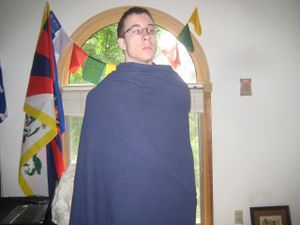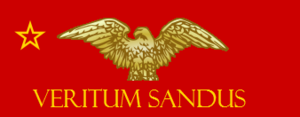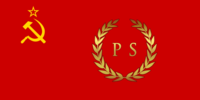People's Democratic Republic of Sandus
This article refers to a micronation or element of micronationalism which is defunct and no longer exists. You can help make the article reflect that or ask on the talk page for further information. |
Populum Democratum Republicum Sandus People's Democratic Republic of Sandus | |
|---|---|
| Motto: Populum Sandus | |
| Anthem: Internationale | |
| File:Maryland, USA | |
| Capital and largest city | Central Administrative District |
| Official languages | Sandum Latin, English |
| Demonym(s) | Sandum |
| Government | Parliamentary Socialist Republic |
• Chairman of the Revolutionary Council | N/A |
| Legislature | Revolutionary Council |
| Establishment | 05 April 2009 |
| Population | |
• Census | 7 (None, after 00:01 29 Jul 2010) |
| Currency | Persuma (¶) |
| Time zone | UTC-5 |
Website [1] | |
This nation is a proud member of the Grand Unified Micronational and L'alliance francophone. | |
The People's Democratic Republic of Sandus, formerly the People's State of Sandus and the Barony of Sandus, was founded May 26, 2009 as the Grand Lamate of Sandefreisitkhan, in the state of Maryland of the United States. It is landlocked by the United States. Sandus is currently going through reforms which shall result in a communist government. The Revolutionary Council is the provisional legislature, created to govern Sandus in these times of reforms to the political system of Sandus.
Location & Territory
Currently, the only districts of the DPRS is the Central Administrative District, which also is the seat of government, or capital, of the state and The District of Arkansas. In the Central Administrative District, the Revolutionary Council officially meets, the Citizens' Communist Party of Sandus has its headquarters, and the People's Defense Forces is based.
The District of Arkansas is located southwest of Little Rock and surrounds Hurricane Lake. It is the home of Sandus' only military vessel , the PSS Principe. James Tyhurst is the acting Governor of the DOA and acts as Admiral of the Arkansan Fleet.
Government
Sandus is a single-party socialist republic. The new constitution for the DPR has been drafted and is currently awaiting ratification by the current Revolutionary Council. The new People's Government came from the abolishment of the monarchy of the Barony of Sandus. The Baron, Guillaume Sœrgèl, then joined with representatives from the Democratic Peoples' Republic of Erusia to work with creating a constitution for the new socialist republic. The current government strives for socialist, communist and Peoples' unity. The Citizens' Communist Party of Sandus is the sole legal party of the nation and is the political vanguard of the state.
Chairman of the Revolutionary Council
The current Chairman of the Revolutionary Council is Guillaume Sœrgèl. The Chairman acts as head of state and government and he presides over the entire Revolutionary Council and over the Central Committee, of which he is a member. Within the Central People's Government, the Chairman is given the responsibility of keeping the Revolutionary Council in order and progress during all meetings of the Revolutionary Council. The Chairman is elected by the Central Committee of the Revolutionary Council and must gain the majority of the Central Committee. The Chairman, similar to a President, is the executive of the government. Within Sandus, the Chairman is given the prerogative to increase ministries of the Central People's Government with the passing of legislation which passes the Revolutionary Council. The Chairman now has five ministries, which include the Ministries of Foreign Affairs, Economy, Defense, Justice and of People's Welfare. The Chairman has been pushing for new Districts and gained the District of Arkansas in the spring of 2010.
Revolutionary Council
The Revolutionary Council is the Legislature branch of the current Sandum government. The Revolutionary Council is the center-point of the Government of Sandus, whose authority ranges every where from military to the passing of laws and regulations on the life of citizens. The sole legal party of the Revolutionary Council is the CCPS which, with the Revolutionary Council, is the political vanguard of the state. The Revolutionary Council is comprised of two "all-state"/"national" levels, which include the General Assembly of the Revolutionary Council and the Central Committee of the Revolutionary Council.
General Assembly
The General Assembly, the lower level of the Revolutionary Council, is where all elected officials have seats. The General Assembly is made up of delegates from each district, which elect a delegate to the Central Committee representing their district. The General Assembly passes legislation and orders which are proposed by the Central Committee; are drafted by the Central Committee; the General Assembly edits the legislation; voted upon in the General Assembly; and then voted upon in the Central Committee, if the legislation passes the vote of the General Assembly. The General Assembly is, essentially, the voice of the people, whereas the Central Committee is the voice of socialism.
Central Committee
The Central Committee, the higher level of the Revolutionary Council, is where elected officials elected by their delegates in the General Assembly hold seats. All delegates of the Central Committee also retain their seats in the General Assembly. The Central Committee is comprised of the elected delegates from districts. The Central Committee is a component of the political vanguard of the nation, along with the Communist Party. The Central Committee passes legislation and orders which are proposed by the Central Committee; are drafted by the Central Committee; the General Assembly edits the legislation; voted upon in the General Assembly; and then voted upon in the Central Committee, if the legislation passes the vote of the General Assembly. The Central Committee is, essentially, the voice of socialism, whereas the General Assembly is the voice of the people.
Revolutionary Council Committees
The Revolutionary Council, too, elects members to the Council Committees. Council committees can be adopted by the Revolutionary Council through the regular process of legislation. The current committees include the Central Advisory, the Central Electoral, and the Central Disciplinary Committees.
Central Disciplinary Committee
The role of the Central Disciplinary Committee is to act as the judiciary of the State. Members are elected by delegates from the Central Committee and from the Political Bureau of the CCPS. The elected delegates act as both jury and judges and decide upon cases in their personal & professional judgments, the interpretation of legislation passed by the Revolutionary Council, and their interpretation of the specific cases and their effects on the socialist society of the State.
Central Advisory Committee
The Central Advisory Committee has the prerogative of ensuring that each delegate of the Revolutionary Council has the equal amount of time, forms elections in times, declare who is in absentia and who is in camera during in camera meetings of the Revolutionary Council, and to have a regular census of the population to ensure that the population is respectfully represented.
Central Electoral Sub-Committee
The Central Electoral Sub-Committee is a Sub-Committee of the Central Advisory Committee, tasked with the elections of seats to the Revolutionary Council. It is given the authority over polling, the regulation of that polling and of the candidates and the regulations to become a candidate. The only regulation outlined in the Articles of the Provisional Government is that to become a candidate of a seat within the Revolutionary Council is that the proposed candidate must be a member of the Citizens’ Communist Party of Sandus or of any other foreign Communist or Socialist Party, Movement, or Front.
Ministries of the State
The Ministries were established on 10 June 2010 with the passing and ratification of the Ministries Act 2010. The act was passed by the majority of the General Assembly and the Central Committee of the Revolutionary Council. The Ministries are provided to help improve the effectiveness of the Central People's Government. The Ministers, the leaders of their respective ministries, also comprise the cabinet of the Chairman.
Currently, the Chairman has not appointed any ministers.
Ministry of Foreign Affairs
The Ministry of Foreign Affairs is tasked with the foreign representation of the state, promoting the foreign integrity of the state, and sending envoys to other nations. Diplomatic Missions and Officers are appointed by the Chairman, with the approval of the Central Committee.
Ministry of the Economy
The Ministry of the Economy is tasked with the minting of money, the collecting of taxes and revenue, the promotion of the economic status of the state, ensuring economic equality and welfare to the best degree, and with holding the assets of the state.
Office of the Treasury
The Office of the Treasury is the office of the Ministry of Economy tasked with the minting of currency, collecting of taxes and tariffs, and the protection and issuing of public currency and, as the name suggests, the treasury. Ever three months, according the Executive Order 061810a, the Office is tasked with declaring the state's income and its assets and to collect taxes.
Ministry of Defense
The Ministry of Defense is tasked with the governance of the People's Defense Forces. The Democratic Guard are members of the Ministry, but are subject to the Central Committee, Political Bureau and the Chairman.
Ministry of Justice
The Ministry of Justice is tasked with advising citizens with legal advice, protection of the accused, an investigation concerning a crime, and with the domestic security of the state - which they work with the People's Defense Forces.
Ministry of People's Welfare
The Ministry of People's Welfare is tasked with the people's care and, as the name says, the people's welfare. It provides housing, food, assistance, education, freedoms and privileges of the state, so long as they do not infringe on the security of the State or People.
Office of Civil Unions
The Office of Civil Unions is an office located within the Ministry of People's Welfare which was established by the Civil Unions Act 2010. The prerogative of the office is to recognize, authorize and interpret the civil unions of the state and ensure the rights of partners inscribed in the Civil Unions Act 2010.
Foreign Affairs
The Foreign Affairs of the Central People's Government is handled by the Ministry of Foreign Affairs, although the Ministry has not been adopted by any legislation passed by the Revolutionary Council. The Foreign Affairs of the State are largely to past allies, but the state remains open to working with other nations. Within this area of the Central People's Government, it is tasked with representing Sandus within the Grand Unified Micronational.
Foreign Affairs Policies
The Current policies concerning foreign relations and affairs are as follows:
- The state must have a definite population, area and the ability to enter into foreign relations.
- The state must not promote anti-Communist or anti-Sandum policies.
- The state must not promote one religion.
- To be recognized, the state must be a serious nation.
- Sandus, being a secessionist movement, will work only with serious micronations.
Culture
Sandum Culture is very unique to Sandus. Many things of this culture is incorporated from other cultures, and some are even ancient culturally. Sandum Culture incorporates itself through out Sandus, and some Americans have been effected by Sandum Culture.
Clothing

Clothing in Sandus is closely related to the robes of the ancient Greeks, the ancient Romans, and the Tibetan Buddhist monks. Traditionally, there are two unique clothing styles.
The first, the Fiera style, consists of one large (enough) sheet of fabric. This is a more formal and sophisticated robe, though it is very easy to make. To make this robe, one needs a sheet held in both hands, held the long way on your back. The corner in the right hand should go on your left shoulder, underneath the sheet, and the corner in the left hand should go on your right should, above the sheet. This is the same style as that of Guillaume Sœrgèl, when he was Lama of Sandefreistikhan, which was used during various photos, speeches, and events. It is now used by delegates of the National Congress.
The second, the Travailla style, consists of one large sheet, just like the Fiera style. This is a more business and everyday robe style, but it is the easiest to make. To make this robe, take both ends in each hand—held the long way on your back. The corner in the right hand is then drape it over your right shoulder. The corner in the left hand is then thrown over the right shoulder—but make sure it stays.
In all Sandum Robe styles, a small slit in the robe should be found in order for the work of the dominant hand. Styles may be reversed in technique in order to make this slit on your dominant side. Your less dominant hand should hold the bottom of that slit closed, or it can be extended through the slit for usage of both hands. Sheets should be long enough to go from both hands, extended in a cross.
Cuisine
Sandum Cuisine is generally related to French cuisine, as it incorporates many French dishes. These include Crêpes, Crème Brûlée, Ratatouille, Beef Bourguignon, Coq au vin, and French bread. Of course, this is not to say that Sandum Cuisine is not effected by local cuisines. Many other cuisines find there way into Sandum Cuisine. Very much so, there is no definite cuisine to Sandus - very much like American cuisine.
Society
Sandum Society is very much centered around the people, then again, due to the former Communist government and strong history of Socialism, which exists to this day. Every person in Sandum society is regarded as equal, and very little racism or sexism is prominent in Sandus. However, some ageism has spurred in Sandus, largely to people whom are over 30 or use adult websites, due to the discrimination of younger people. This ageism is largely ignored to those who are deemed respectful by the masses of the people. However, though, profiling and discrimination is banned in government.
Music
Music in Sandus varies by the mood of the person, the day and the time of day. Music is classified into 4 major categories which are listened to in Sandus. These include:
- Ancient or Neo Hellenic Greek Hymns such as ΛΟΓΟΣ, ΕΡΓΟ, ΝΟΗΜΑ (ΜΗΤΕΡΑ ΜΕΓΑΛΟΨΥΧΗ).
- Heurea (SL: Happy or Upbeat) Music such as Un Autre Monde by Téléphone.
- Buddhist Prayers or Hymns such as The Sevenline Prayer to Guru Rinpoche by Ani Choying Drolma.
- Classical music such as Bach or Mozart.
- New Age music, such as Enya or Medwyn Goodall.
- The delegate to the Revolutionary Council from the Arkansas Territory, James Tyhurst - the sole Libertarian of the Citizens' Communist Party of Sandus, has also declared his liking for the band Tool.
Media
Media in Sandus is run by the government, due to its socialist economy. The two major media sources in Sandus are Channum Unum and Veritum Sandus.

Channum Unum - Channel
Channum Unum is the channel of Sandus. Channum Unum currently plays the national anthem, commercials for Air France and Aeroflot- and various patriotic songs of Sandus. You can always watch Channum Unum on LiveStream.
Sandum Central News
Sandum Central News is a news program by Channum Unum meant to connect Sandum citizens and foreigners to the State. It reports news from Sandus, from around the international community and reports weather and Persuma exchanges. It's first showing will be 5 June 2010 at 1600 EST or 21 UTC on Channum Unum.
Veritum Sandus - Newspaper

Veritum Sandus is the official state newspaper. The first issue was issued on 20 June 2009, since when is has moved to the internet. Currently, Veritum Sandus is being reorganized since the fall of the Barony of Sandus.

